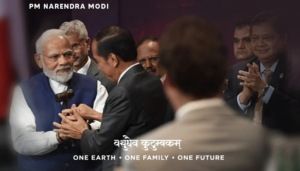News
Indian leader Narendra Modi reflects on future of the planet as his country assumes G20 Presidency
This article is more than 3 years old.
Theme of ‘One Earth, One Family, One Future’ outlined on December 1

Today, India begins its G20 Presidency.
The previous 17 Presidencies of the G20 delivered significant results – for ensuring macro-economic stability, rationalizing international taxation, relieving debt-burden on countries, among many other outcomes. We will benefit from these achievements, and build further upon them.
However, as India assumes this important mantle, I ask myself – can the G20 go further still? Can we catalyze a fundamental mindset shift, to benefit humanity as a whole?
I believe we can.
Our mindsets are shaped by our circumstances. Through all of history, humanity lived in scarcity. We fought for limited resources, because our survival depended on denying them to others. Confrontation and competition – between ideas, ideologies and identities – became the norm.
Unfortunately, we remain trapped in the same zero-sum mindset even today. We see it when countries fight over territory or resources. We see it when supplies of essential goods are weaponised. We see it when vaccines are hoarded by a few, even as billions remain vulnerable.
Some may argue that confrontation and greed are just human nature. I disagree. If humans were inherently selfish, what would explain the lasting appeal of so many spiritual traditions that advocate the fundamental one-ness of us all?
One such tradition, popular in India, sees all living beings, and even inanimate things, as composed of the same five basic elements – the panch tatva of earth, water, fire, air and space. Harmony among these elements – within us and between us – is essential for our physical, social and environmental well-being.
India’s G20 Presidency will work to promote this universal sense of one-ness. Hence our theme – ‘One Earth, One Family, One Future’.
This is not just a slogan. It takes into account recent changes in human circumstances, which we have collectively failed to appreciate.
Today, we have the means to produce enough to meet the basic needs of all people in the world.
Today, we do not need to fight for our survival – our era need not be one of war. Indeed, it must not be one!
Today, the greatest challenges we face – climate change, terrorism, and pandemics – can be solved not by fighting each other, but only by acting together.
Fortunately, today’s technology also gives us the means to address problems on a humanity-wide scale. The massive virtual worlds that we inhabit today demonstrate the scalability of digital technologies.
Housing one-sixth of humanity, and with its immense diversity of languages, religions, customs and beliefs, India is a microcosm of the world.
With the oldest-known traditions of collective decision-making, India contributes to the foundational DNA of democracy. As the mother of democracy, India’s national consensus is forged not by diktat, but by blending millions of free voices into one harmonious melody.
Today, India is the fastest growing large economy. Our citizen-centric governance model takes care of even our most marginalized citizens, while nurturing the creative genius of our talented youth.
We have tried to make national development not an exercise in top-down governance, but rather a citizen-led ‘people’s movement’.
We have leveraged technology to create digital public goods that are open, inclusive and inter-operable. These have delivered revolutionary progress in fields as varied as social protection, financial inclusion, and electronic payments.
For all these reasons, India’s experiences can provide insights for possible global solutions.
During our G20 Presidency, we shall present India’s experiences, learnings and models as possible templates for others, particularly the developing world.
Our G20 priorities will be shaped in consultation with not just our G20 partners, but also our fellow travelers in the global South, whose voice often goes unheard.
Our priorities will focus on healing our ‘One Earth’, creating harmony within our ‘One Family’ and giving hope for our ‘One Future’.
For healing our planet, we will encourage sustainable and environment-friendly lifestyles, based on India’s tradition of trusteeship towards nature.
For promoting harmony within the human family, we will seek to depoliticise the global supply of food, fertilizers and medical products, so that geo-political tensions do not lead to humanitarian crises. As in our own families, those whose needs are the greatest must always be our first concern.
For imbuing hope in our future generations, we will encourage an honest conversation among the most powerful countries – on mitigating risks posed by weapons of mass destruction and enhancing global security.
India’s G20 agenda will be inclusive, ambitious, action-oriented, and decisive.
Let us join together to make India’s G20 Presidency a Presidency of healing, harmony and hope.
Let us work together to shape a new paradigm – of human-centric globalisation.
For the full blog, click here.










































